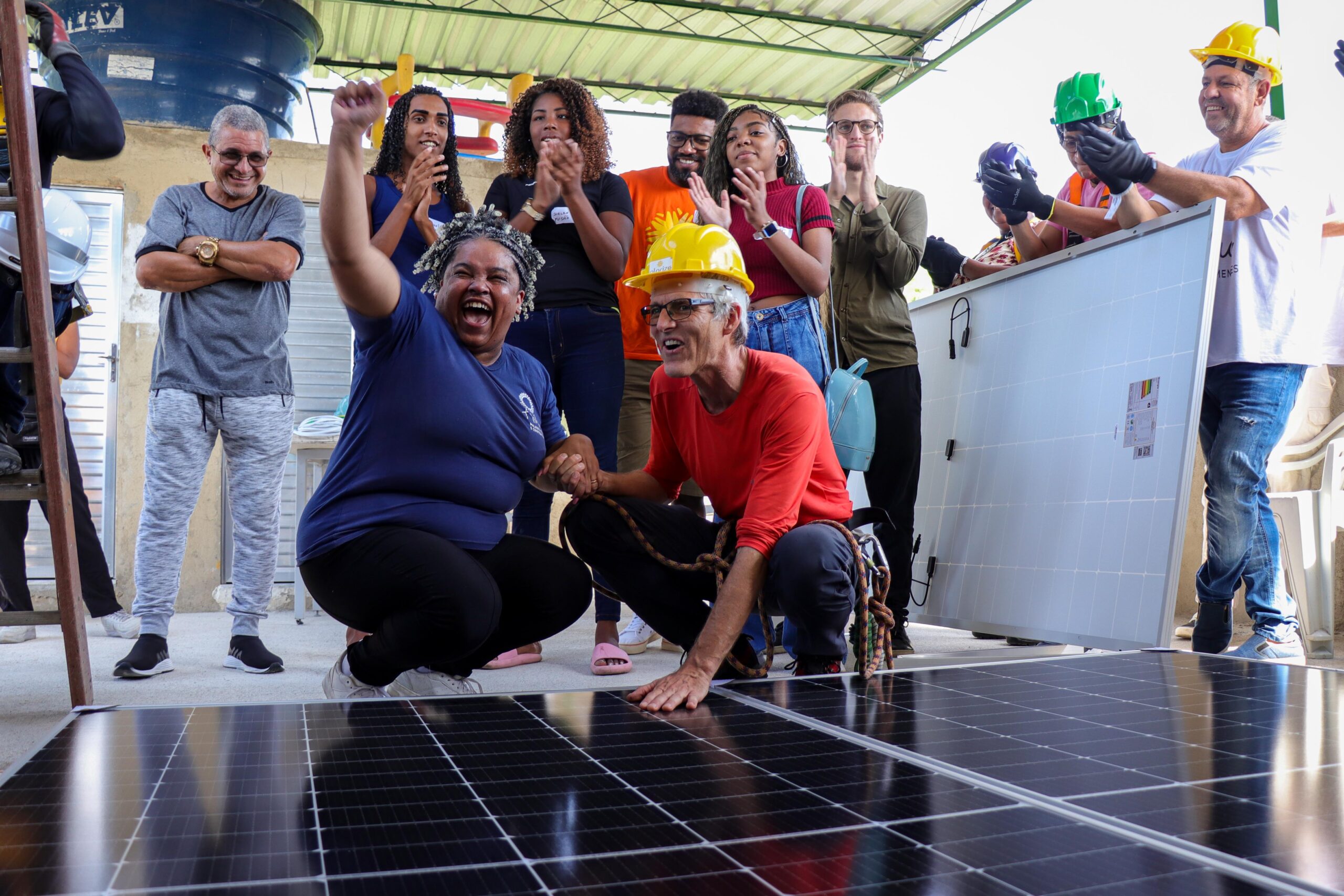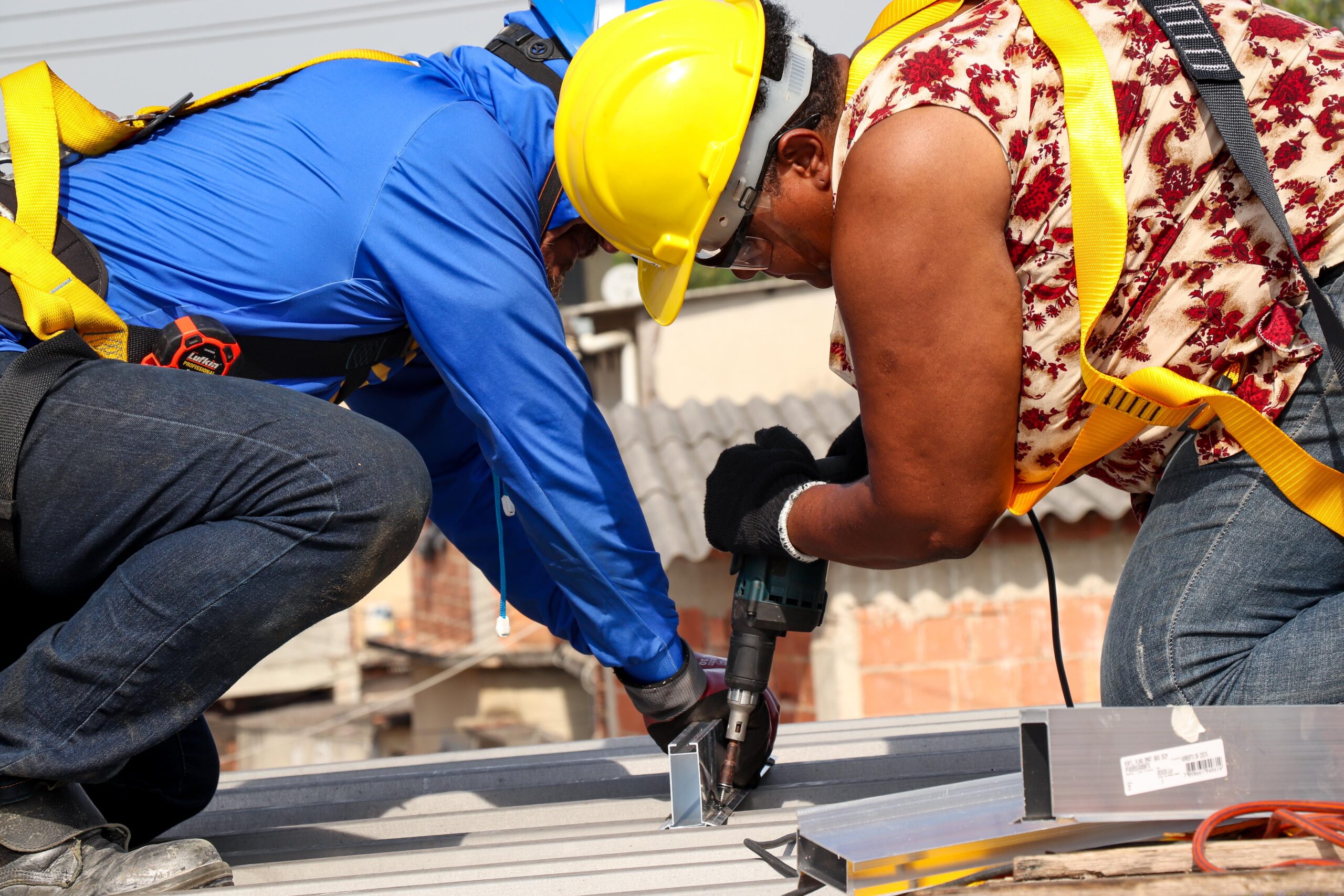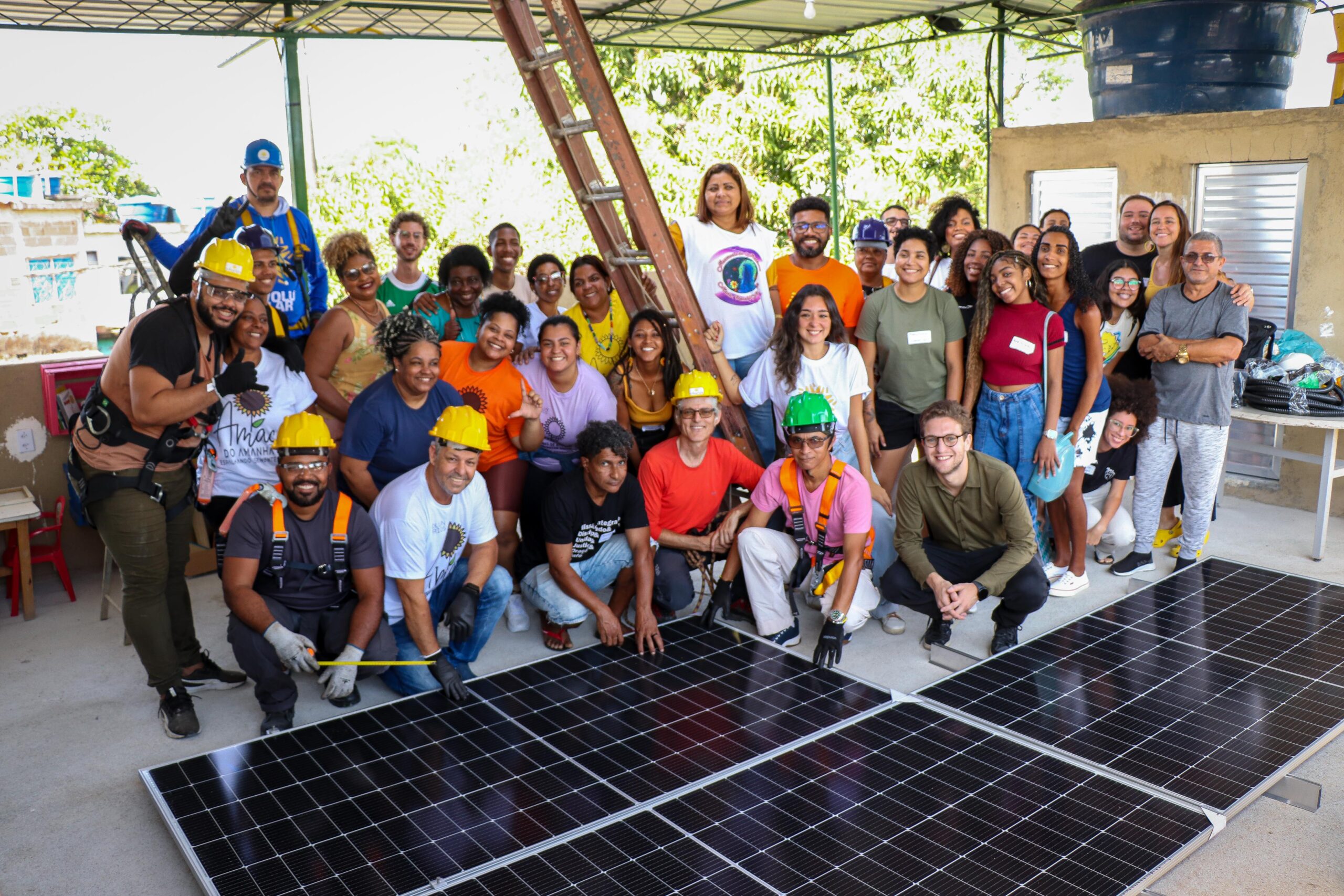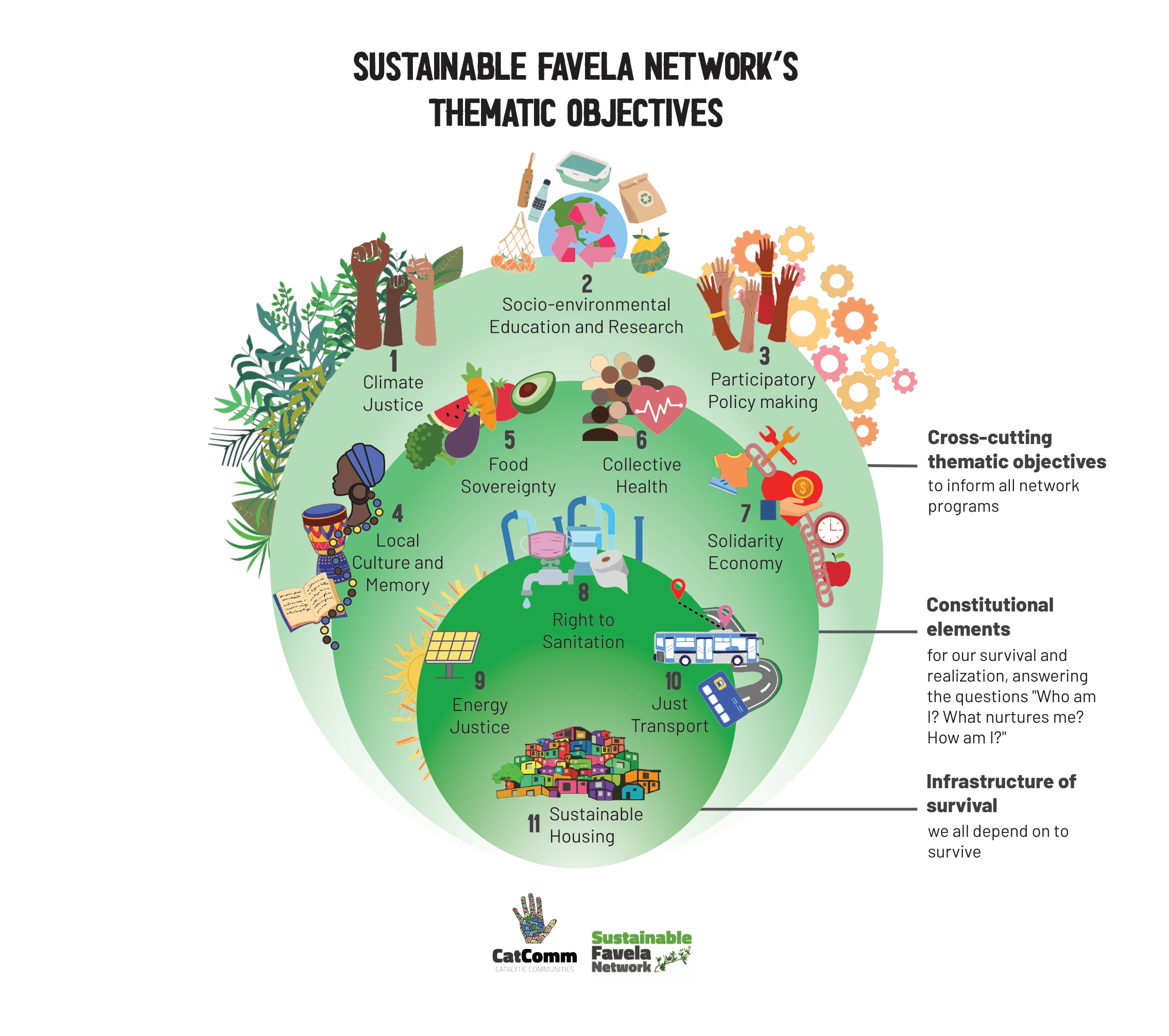Clique aqui para Português
Press conference and launch event, on September 17, will bring together residents and allies responsible for the project. Click here to register. Watch and share the above video with English subtitles. [View PDF]
September 10, 2023—The Association of Women With Attitude and Social Commitment (AMAC), which for 11 years has fought for women’s rights and against domestic violence in Duque de Caxias, a municipality in Greater Rio de Janeiro’s Baixada Fluminense region, just took a leap as an incubator of sustainable practices. On September 17, AMAC will host journalists, community leaders, and allies from the Sustainable Favela Network (SFN)* for a press conference and the official launch of its latest achievement: a photovoltaic system installed at its headquarters in the favela of Dique da Vila Alzira. The event is open for registration.
“Society has imposed a false barrier on us. When I saw the possibility of bringing solar energy to my community in the Baixada Fluminense, where everything is harder [to achieve], and at the same time, not only bringing it here but also enabling residents and young people to see it as a possibility for personal and professional growth, I didn’t think twice.” — Nill Santos, Founder and President of AMAC
Despite having excellent solarimetric potential to explore solar energy, the Baixada Fluminense region has barely tapped into this opportunity. Despite approximately 57% of the population of the city of Rio de Janeiro and a significantly larger geographic area, the installed photovoltaic capacity of the region represents only 23% of that of the city of Rio de Janeiro. The unrealized solar potential of the region is gigantic.
“When we see solar energy [in our area], which is a kind of energy that is cleaner, more ecological, better for our planet, we really begin to see the possibility of a better future. We are on the right path, towards our dreams, and our nieces and nephews, kids, grandchildren, will have a better future to live in. And it’s up to us to prepare this world for them. AMAC has become a pioneer of solar energy, in Duque de Caxias! Not even the government looks in our direction, and look at what we’re building.” — Gabriel Souza, AMAC Social Educator
A Dream Realized as Women Survivors of Domestic Violence Rebuild their Lives in Partnership with Network of Socio-Environmental Activists
The Association of Women With Attitude and Social Commitment (AMAC) was founded in 2012 by Nilcimar “Nill” Maria Santos, a resident of the Dique da Vila Alzira favela. The already high rates of femicide and sexual harassment are on the rise in Brazil, and the Baixada Fluminense leads the state of Rio de Janeiro in cases of violence against women. Unfortunately, Nill was one of these victims. In 2007, however, she managed to break the cycle of violence and through a network of exchanges, conversations, and support with other women in her community, the idea of creating AMAC was born.
“AMAC’s primary mission is to rebuild and reconstitute lives, empowering women, especially those who are victims of domestic violence. AMAC is responsible for many activities and initiatives aimed at empowering and educating the communities in Caxias about women’s rights.” — Nill Santos

It was on the basis of these actions that Nill joined the Sustainable Favela Network, to share experiences with a metropolitan network of favela organizers united by the search for socio-environmental solutions to problems faced in their areas. The Sustainable Favela Network is made up of 400 members, including over 195 community organizers in 127 favelas in Greater Rio and technical allies.
“The Sustainable Favela Network is very important. Its strength lies in transforming this process into something lighter because [the work] is shared through the network. We know we’re not alone, that there are no limits when we’re part of a network. When we talk about solar energy we are also talking about the exchange of energy between people.” — Nill Santos
Since the SFN was formed in 2018, Nill has been engaged in various working groups, including around energy justice, one of the SFN’s thematic objectives. It was in this context that she shared her desire to make AMAC’s headquarters sustainable, both economically and environmentally, and to make it an example that could inspire others in the community and municipality. By realizing the potential of favelas as models of sustainable communities, the SFN and its members hope to boost the qualities that already exist in favelas across Greater Rio and move towards achieving climate justice for these communities.
Allies from Materials to Installations
AMAC is the Sustainable Favela Network’s third grassroots member organization to install a photovoltaic system jointly with the SFN, thus becoming an ambassador of solar energy in the favelas. Previous systems were installed at Ser Alzira de Aleluia (Vidigal) in 2021 and Cooperativa Vale Encantado (Alto da Boa Vista) in 2022. In every instance, various partners joined to accomplish the goal.
“[The solar installations at headquarters of reference organizations in favelas] are pilot projects that should be replicated, becoming public policy.” — Gisele Moura, Sustainable Favela Network Managing Team Coordinator
In the case of the 2023 AMAC installation, training for local installers was carried out by the Rio reference, Solarize Professional Training, a company that is also an active technical ally in the SFN’s energy justice group. All the materials were donated: AE Solar donated the modules, SMA the inverter, Clamper the surge protection devices, Solar Group the structures, Almax Energia the tools, and Bold Energy contributed as distributor of the modules. Instruction was conducted by Solarize, who signed the electrical project and conducted the connection process with the electric utility. The equipment was installed by community technicians, trained by Solarize, so the community itself is able to maintain the system and generate income with this new profession.
“We’re at an NGO of women for women, for families. This focus is very important: they need affordable energy, they need these savings to continue offering the essential work they do to their community.” — Hans Rauschmayer, Solarize Professional Training
Among those trained is Edize Maria Santos, resident of the neighboring community of Cangulo, in Duque de Caxias, who works as a cabinet installer.

“Solar energy has all the potential to succeed in our country. [But] it depends on the goodwill of both government and energy utilities, because it’s not in their interest… [for the] population [to become] independent from their energy. Let’s hope everything works out, so we can have solar energy in our communities, in the favelas, and in the Amazon.” — Edize Maria Santos, cabinet installer trained as a photovoltaic installer during implementation of the AMAC system
In parallel to the process of preparation and installation, a mini-course was conducted for solar ambassadors belonging to the Sustainable Favela Network, by Revolusolar, a founding member of the SFN energy justice working group. The organization began in the communities of Babilônia/Chapéu-Mangueira, a favela complex in the South Zone of Rio de Janeiro, that currently works in locations across the city and country. On the first day of installation, August 12, 20 organizers from other SFN favelas were present at AMAC to observe the process and take knowledge back to their communities. This was the final day of the mini-course, and they presented their future visions for solar energy in their respective communities.

“It made a big impact to come here and see the panels up close. We had only seen them online. The potential of solar energy for favelas and peripheral communities is enormous, and very important. It makes your eyes sparkle.” — Matheus Edson, Social Educator from Rio das Pedras favela
AMAC, Solarize, Revolusolar and all SFN members involved in this beautiful construction invite the public to the press conference and official launch of the photovoltaic system in the Dique da Vila Alzira favela, on Sunday, September 17, at 9am. To register, click here.
“Solar energy exists in the favela, for real! No one told me about it, it’s me who’s living it. We saw how a solar panel changed an entire community, bringing innovation not only to the community, but also to the state of Rio.” — Gabriel Souza
PRESS CONTACT
Click here to participate in the press conference and launch
WhatsApp +55-21-991976444
Email: press@catcomm.org
Photos available for use.
Watch the above video with English subtitles and embed it in your article here.
SEPTEMBER 17 PRESS CONFERENCE AGENDA
- 9am BREAKFAST
- 10am PRESS CONFERENCE
- 12pm CLOSING
View the photos of the installation of the photovoltaic panels at the AMAC headquarters here:
*The Sustainable Favela Network (SFN) and RioOnWatch are projects of Catalytic Communities (CatComm).


